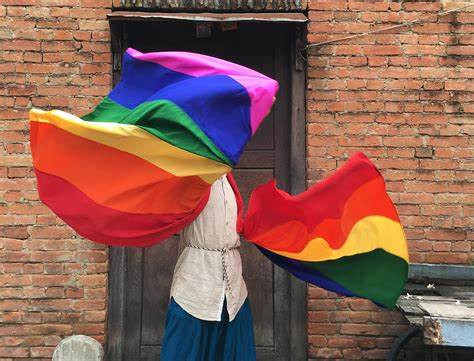I first felt that I was attracted to women as well as men when I was eleven years old. The only vocabulary I knew to label this feeling was ‘bisexual’. Over the years, I went from believing “I think I am bisexual, but it can only be confirmed once I have a physical experience” to “I am definitely bisexual, however this word makes me uncomfortable” to finally the peace I experience now with the statement “I am a queer woman”.
Language is important. The words that women use and how we use them has the potential for the radical redefining of convention. What does it mean to be queer? Similar to ‘slut’ and ‘feminist’, queer is a word that has been reclaimed from being a derogatory slur used by bigots against us, to something we proudly declare as our identities.
I feel that ‘queer’ represents my identity better due to the fluidity of the word which requires me to explain myself less to other people and makes me feel more empowered. The fact that bisexual has the suffix -sexual in it often results in unnecessary hyper sexualisation and fetishization.
Bisexual invisibility and erasure both within the LGBTQIA+ movement and in the wider world are very real challenges. It is expected of everyone that we are born straight, and that we must spend our adolescence and early adulthood striving to find the perfect partner of the opposite sex. I have definitely thought about how my life will be much more challenging if I have a female partner compared to having a male partner. Bisexual people have a choice – be with a person of the opposite sex as you are expected to do or make the hard decision and live your life as a queer person. We walk on the line between straight and gay and straight is much safer which is why there is so much bisexual invisibility in society.
Every aspect of our societal and community lives are built upon the expectation that all people are straight and will enter man-woman relationships and uphold traditional family dynamics. This is what we call heteronormativity. To be heterosexual is the norm and to go against the norm, to not be straight, is a defiant act.
When two women are in a relationship with no men involved, it challenges and refuses to uphold the patriarchy in their personal lives. Saying “We do not need a man to be fulfilled” and living an entire life man-free is a big political statement. It disrupts the heteronormative expectation on which our society is single-handedly built.
The social, cultural, political and economic dimensions of our world rely on compulsory heteronormativity to continue functioning seamlessly. Compulsory heterosexuality is propagated by everything we hear and see around us. A heterosexual relationship is the focus of 90 percent of movies, television shows and songs. It is the focus of 90 percent of conversations that we find ourselves in during our ‘peak reproduction age’ – especially for women.
“Do you have a boyfriend? Should we find someone for you? It’s time to get married, look at everyone around you! Your clock is ticking!”
This conditioning to be culturally straight runs deep for women, and the spaces where we can question whether we are allowed to have relationships beyond this social framework is really not easy, especially in Nepal. Men are also affected by this societal pressure, but it is seen as much more acceptable for a man to be single in his 40s than it is for a woman. The patriarchy tells us throughout our lives that we need a man. In Nepal our reliance on men is forced upon us explicitly. When we look at the most disadvantaged communities, this is a matter of survival, of violence.
I truly believe that many more women, and men, fall on the queer spectrum then they are socially given permission to explore. If a woman’s straightness is essential for her to survive in a patriarchal society, then a man’s straightness is enforced upon him so that toxic masculinity can survive as the powerful and oppressive tool that it is. In conclusion, compulsory heterosexuality hurts us all.
